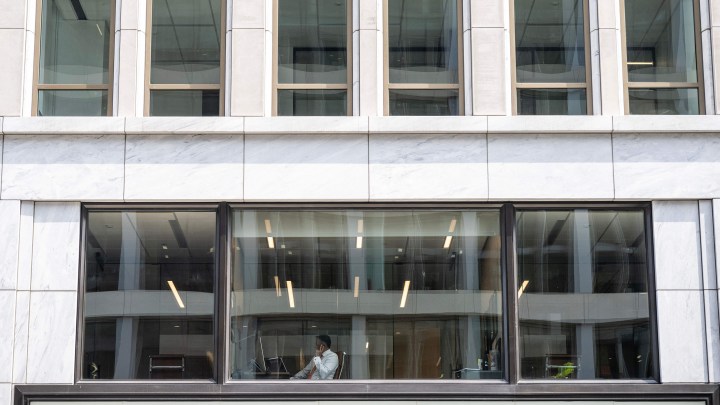
Here’s what might happen if all that open office space stays empty
Here’s what might happen if all that open office space stays empty

We’ve been keeping our finger on the pulse when it comes to developments in the commercial real estate sector. The fears are that too much empty office space in cities across the country and world could trickle down into loan defaults and ultimately send a shock through our financial system. But how likely is that outcome and where do things currently stand?
For more on this, “Marketplace Morning Report” host Sabri Ben-Achour spoke with Lisa Knee, managing partner and national leader of the real estate practice EisnerAmper. Thank you so much for joining us.
Sabri Ben-Achour: We know that some companies are not renewing leases for office space. We know that sometimes, here and there, they’ve broken their leases, just gotten out of them. We hear these anecdotes, but do we have a sense of how widespread this is? How bad is it? How bad will it be?
Lisa Knee: So, sublet space across the country is up about 250 million square feet. The vacancies are definitely climbing in most markets. So none of the markets are immune. And we know that office loan credit is deteriorating.
Ben-Achour: Some $1.5 trillion in U.S. commercial real estate loans are coming due this year and next year, according to the Mortgage Bankers Association. If those loans cannot be repaid in full, what does that do to the financial system? Can the financial system handle that?
Knee: We know when the loans are coming due, but we don’t know when the leasing within those spaces is coming due. And so when you look at valuation of the loans that are coming due to see who’s either going to take those out, and who’s going to say that that’s still a good investment, we were speaking to a client in San Francisco, and it’s figuring out who’s going to take out those loans and become the market maker. And it might be a much smaller per square foot, as a valuation, but the banks are no longer willing partners in purchasing this. So we are going to need to come in and get some more creative investors, different strategies of who’s going to come in, and basically fill the need for the capital that has to be put in to bail those offices out of where they are. The regulators and the banks, they’re going to require more capital to even bail people out.
Ben-Achour: Is this a situation where we’re gonna see strain on banks like what we saw with Silicon Valley Bank, Signature Bank — that kind of thing? Are we headed there?
Knee: So when you looked at what was happening with those banks, it was what the asset was on those balance sheets and the liabilities being greater than the assets. You still have dirt here, you still have an actual building. And it’s just what the valuation and what somebody’s willing to pay for the building. And what was interesting with a lot of this stuff is what the loan-to-value ratios are. And so we’ve learned a lot over the last years in real estate, and the loan-to-value ratios on most of these projects actually had a little bit of room in there, so that the balance sheet should still stay relatively strong. So if the values drop, there still is cushion there.
There’s a lot happening in the world. Through it all, Marketplace is here for you.
You rely on Marketplace to break down the world’s events and tell you how it affects you in a fact-based, approachable way. We rely on your financial support to keep making that possible.
Your donation today powers the independent journalism that you rely on. For just $5/month, you can help sustain Marketplace so we can keep reporting on the things that matter to you.











